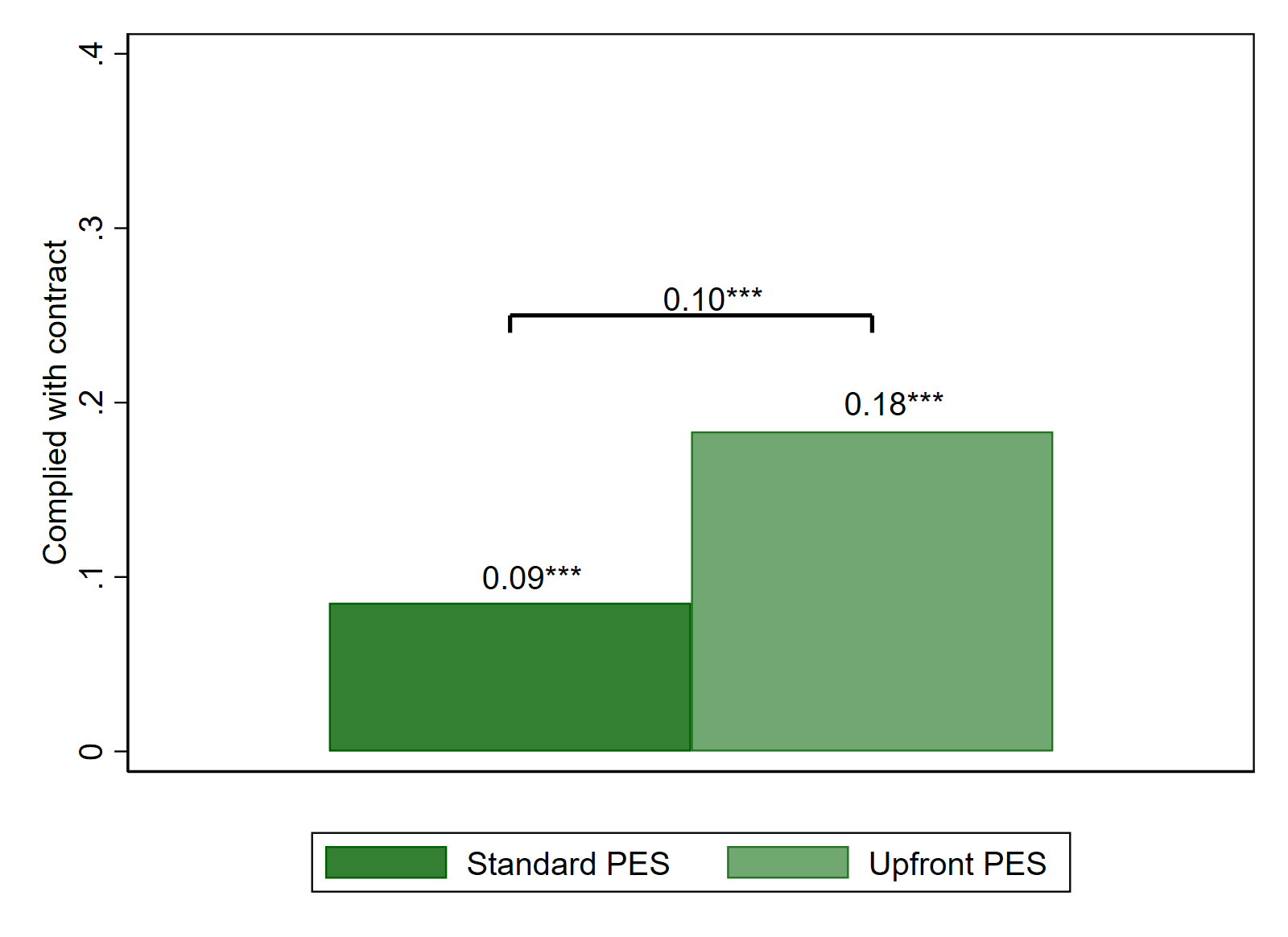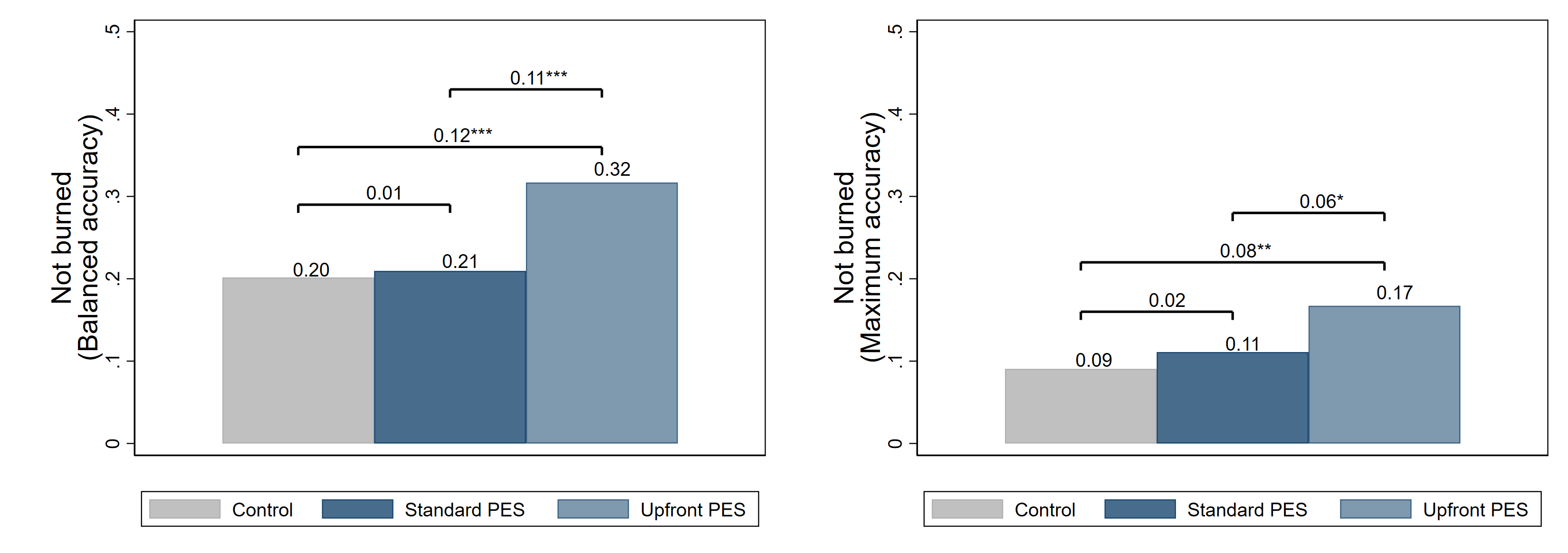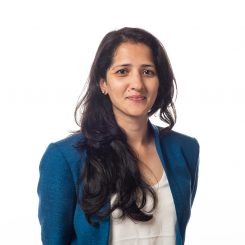CEEPR Working Paper
2023-05, February 2023
B. Kelsey Jack, Seema Jayachandran, Namrata Kala, and Rohini Pande
Worldwide, poor air quality is a leading preventable cause of death and morbidity. Air pollution reduces the life expectancy of North India’s roughly half a billion residents by up to seven years, which represents one of the largest health burdens from pollution in the world.
A major source of air pollution in India is the use of fires to clear agricultural land. Every winter, farmers in North India burn rice stalk (residue) to clear fields. Despite a clear economic case for reducing this pollution, as well as efforts to prohibit and fine those who produce it, agricultural pollution in North India has increased over the last few decades.
Existing policies have failed to account for incentives of two groups of actors: (1) local officials’ incentives to enforce penalties when the costs and benefits of polluting activities are in different political jurisdictions, and (2) farmers’ incentives to protect the environment given that the costs of pollution are largely borne by others. In our paper, we ask whether a policy that explicitly considers these incentives can reduce pollution.
We investigate the feasibility of Payments for Ecosystem Services (PES) contracts, which pay farmers for not burning crop residue. PES programs raise the private cost of environmental degradation by conditioning cash transfers on avoiding an environ- mentally harmful behavior. By using a carrot rather than a stick, PES avoids the political challenges of fines. By placing the incentive on the desired outcome rather than the input, PES is a more flexible approach than equipment subsidies.
However, contextual and institutional factors may limit the efficacy of PES — and, more broadly, conditional cash transfers — in low and middle-income countries such as India. PES participants must undertake a costly action to comply with the program and receive payment. Farmers may not comply if they do not trust that the conditional payment will be made. They may also fail to comply if they lack cash on hand to pay for alternatives to burning before receiving the PES payment. Both of these factors may limit PES efficacy.
PES contracts that offer partial payment in advance may help with trust and liquidity. An upfront payment can increase trust that a subsequent conditional payment will occur. It can also alleviate liquidity constraints when farmers need to spend money on alternatives to burning.
However, recouping the upfront payment if the participant fails to comply is frequently infeasible or undesirable in low-income settings. Practically, upfront payments must then be unconditional, potentially undermining their usefulness for at least two reasons. First, offering a portion of the total payment upfront and unconditionally lowers farmers’ marginal incentives to comply because the conditional payment is smaller. Second, upfront payments reduce cost-effectiveness due to payments to non-compliant farmers. Hence, the net effect of upfront and unconditional payments on compliance and cost-effectiveness is ambiguous.
Motivated by these observations, we conducted a randomized controlled trial in 171 Punjabi villages during the 2019 rice growing season to compare the efficacy of standard PES and partial upfront PES. We compare three farmer groups: (1) those who did not receive a contract (control), (2) those who received a contract with payment conditional on verification that the farmer did not burn (standard PES), and (3) those who received a contract with a partial upfront payment that was (explicitly) unconditional on compliance, with the remainder conditionally paid after verification (upfront PES).
Our main finding is that upfront PES led to a 10 percentage point higher contract compliance than standard PES; a doubling of the compliance rate (see Figure 1). Remote sensing estimates of burning are consistent with the contract compliance results. We see a roughly 10 percentage point lower rate of burning among farmers offered upfront PES versus standard PES. The remote sensing measure also reveals that standard PES had no effect on burning when compared to the control group. This indicates that standard PES payments were inframarginal, i.e., paid to farmers who would not have burned even without PES. The upfront PES effect size corresponds to a 50-80% higher rate of not-burning than in the standard PES arm or control group.

Figure 1. Contract Compliance For Treatment Groups
Why did partial upfront contracts outperform standard PES contracts? For insight, we examine farmer responses to endline survey questions about the role of cash constraints and trust in determining their PES program response. Farmers assigned to the upfront PES treatment have 6.8% higher trust that contract payments will be made than those assigned to standard PES. Around 70% of farmers say cash on hand affected their crop residue management decisions, suggesting that this was an important overall constraint. However, responses about cash on hand did not differ by treatment. In contrast, heterogenous estimates by baseline levels of general (rather than PES program-specific) liquidity and trust do not support either mechanism explaining the relative efficacy of upfront PES. Overall, we take these results as suggestive evidence that trust may be the mechanism affecting the relative success of upfront payments.
To evaluate the cost-effectiveness of PES programs, we compare PES costs with the benefits of reduced residue burning. We first calculate the cost-per-additional-acre-not-burned for the two treatments using our remote sensing-based outcome. Standard PES has no statistically significant impact on burning. Upfront PES, on the other hand, reduced burning and the cost-per-additional-acre-not-burned (see Figure 2 below). Despite noncompliance from a substantial portion of farmers paid upfront, the estimated cost of the program is drastically lower than our rough per-acre mortality benefit estimate ($7,600).
These results show that crop residue burning can be reduced through well-designed PES payments. Our design, which take institutional constraints and farmer concerns into account, can significantly improve efficacy. Providing a portion of the contract payment upfront results in larger reductions in burning than providing the entire payment after participants have completed costly behavior change. Despite higher “wasted” payments (to farmers who continue to burn), PES with upfront payments is still cost-effective. It results in burning reductions that provide benefits far in excess of their cost.
PES programs provide reasons for optimism. Such programs are appealing because they can be implemented by organizations that want to reduce fires but lack the authority to levy fines. Furthermore, in the future, the need for upfront payments might become less important as trust in being paid grows. The enormity of the environmental damage caused by crop residue burning in India justifies investment in PES programs and highlights the need for further research to find viable solutions to this problem.

Figure 2. Impact on Burning by Different Treatment Groups Using Two Machine Learning Models






